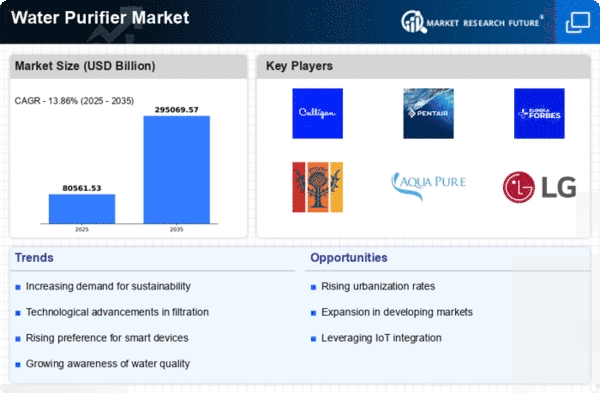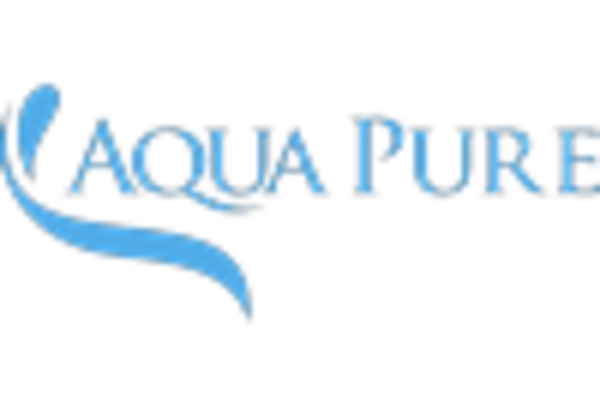Market Share
Water Purifier Market Share Analysis
The World Health Organization (WHO) is actively engaged in campaigns aimed at raising awareness about health and safety issues worldwide. These campaigns focus on educating people about the causes of various illnesses, emphasizing the crucial role of safe drinking water, sanitation, and proper hand hygiene. According to the WHO, an alarming 4 billion cases of diarrhea occur globally each year due to unsafe drinking water, inadequate sanitation, and poor hand hygiene practices. The consumption of impure or contaminated water is directly linked to the prevalence of diseases such as cholera, diarrhea, dysentery, and typhoid. The increasing incidence of these serious illnesses is driving a growing awareness among individuals about the importance of drinking pure water, leading to a rising demand for commercial water filters.
Governments worldwide are taking proactive measures to ensure the supply of clean and purified water to their populations. For instance, in December 2020, Honourable Marc Miller, Minister of Indigenous Services, announced a substantial investment of USD 1.5 billion for clean drinking water. Additionally, an annual allocation of USD 114.1 million from 2020 onwards was designated to support the daily operations and maintenance of water infrastructure on reserves. In India, the government's initiative called Jal Suddhi, set to launch in the coming years, aims to provide clean and purified water to over 21,000 habitations, spanning various states and benefiting around 47 million people. Such governmental schemes are expected to involve the installation of commercial water filters in villages affected by contaminated water, contributing to the growth of the global commercial water filter market.
While the demand for commercial water filters is currently restrained in certain regions due to cost considerations outweighing health priorities, there is a notable shift occurring. As the number of diseases caused by contaminated water continues to rise, the impact of increasing awareness about water-borne illnesses on the global commercial water filter market is expected to transition from moderate to high in the forecast period.
The emphasis on educating individuals about the dangers of unsafe water and the importance of adopting water purification measures is a crucial aspect of WHO's campaigns. By highlighting the direct link between impure water consumption and diseases like cholera, diarrhea, dysentery, and typhoid, these initiatives play a pivotal role in shaping public perception. The goal is to instigate a behavioral change, encouraging people to prioritize clean water consumption and consider the adoption of commercial water filters as a proactive health measure.
Government initiatives, such as the substantial investments announced by Honourable Marc Miller, demonstrate a commitment to addressing water quality issues and ensuring access to clean drinking water. Similarly, projects like Jal Suddhi in India signify a targeted effort to combat water contamination in specific regions, further driving the need for commercial water filters. These initiatives not only address the immediate challenges but also contribute to the long-term well-being of communities by fostering healthier water consumption habits.
In regions where the demand for commercial water filters is currently limited due to cost constraints, the changing scenario is noteworthy. The rising incidence of water-borne diseases is prompting a reconsideration of priorities, with health concerns taking precedence over economic considerations. This shift is expected to propel the global commercial water filter market towards higher growth rates in the forecast period.
The global efforts led by organizations like WHO and initiatives by governments to provide clean drinking water are pivotal in creating awareness about water-borne diseases. As awareness increases, the demand for commercial water filters is likely to surge, driven by a growing recognition of the importance of safe and pure water consumption. The shift in priorities, supported by government schemes and rising health consciousness, positions the commercial water filter market for significant growth in the coming years.


















Leave a Comment